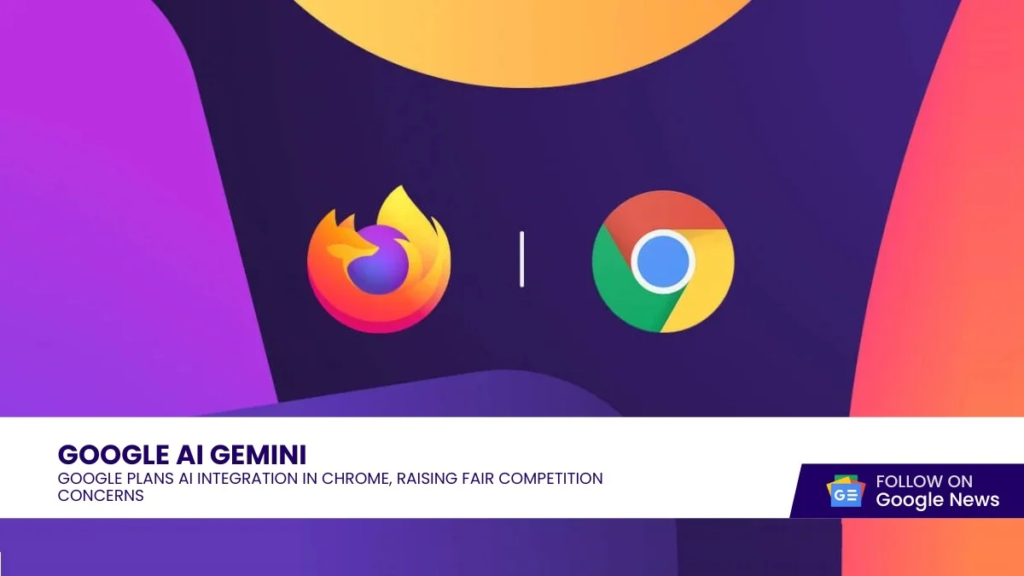
Google AI Push: Gemini in Chrome Unveiled
- hafsaakram47
- Reading Time 5

At Google I/O 2025, Google introduced Gemini in Chrome, embedding its Google AI Gemini Nano model directly into the browser. This integration allows developers to build AI in Chrome applications, such as extensions for text translation, proofreading, and summarization, without cloud dependency. Available to Google AI Pro and AI Ultra subscribers, as well as Chrome Beta users, since May 21, 2025, the feature enables tasks like summarizing web pages or analyzing YouTube videos in real time.
Google’s director of Chrome product management, Charmaine D’Silva, demonstrated how Gemini in Chrome can list key features of a product on a retail website or navigate recipe sites, highlighting its potential to streamline user tasks.
A Threat to Browser Competition
Mozilla has raised alarms about Google AI Gemini integration, warning that it could disrupt browser market competition. Brian Grinstead, a senior principal engineer at Mozilla, stated, “The browser choice of AI model has the potential to make the user experience worse in Firefox and other browsers.” He argues that developers may optimize applications for Gemini, leading to inconsistent performance across browsers and nudging users toward Chrome.
This concern echoes historical browser wars, where websites optimized for Internet Explorer or Chrome marginalized competitors. Mozilla fears that AI in Chrome could create a similar monoculture, limiting consumer choice and stifling innovation.
Google Defense:
Google has countered Mozilla’s claims, asserting that Gemini in Chrome is a technical advancement, not a monopolistic strategy. Software engineer Domenic Denicola emphasized, “We’re not trying to pick winners,” and invited dialogue to address implementation concerns. Google highlights that Gemini in Chrome enhances user experience with privacy-focused, on-device AI processing.
However, developers remain skeptical, noting that seamless AI in Chrome features may push them to prioritize Chrome for compatibility, inadvertently reinforcing Google’s dominance in the browser market competition.
Features of Gemini in Chrome:
The Google AI Gemini integration offers a suite of Chrome AI APIs for developers, including:
- Text summarization
- Language detection
- Proofreading and writing assistance
- Real-time video analysis (e.g., identifying tools in YouTube videos)
These Chrome AI features are accessible via a sparkle icon in Chrome’s top-right corner, opening a chatbot window that interacts with webpage content. For example, users can ask Gemini to summarize an article or modify a recipe. Future updates will enable Gemini in Chrome to work across multiple tabs and devices, enhancing capabilities like product comparisons.
Feature | Description | Availability |
Text Summarization | Summarizes web content | Chrome Beta, AI Pro/Ultra subscribers |
Video Analysis | Identifies objects in videos | US users, English language setting |
Navigation Assistance | Scrolls to specific webpage sections | Future release |
Multi-Tab Support | Compares content across tabs | Planned for future updates |
Source: Google I/O 2025 Announcements
The Browser Wars and AI Role
The browser market competition has a storied history, from Microsoft’s Internet Explorer dominance in the 1990s to Chrome’s rise in the 2010s. Google’s integration of Google AI Gemini into Chrome mirrors past strategies where proprietary features favored one browser, raising antitrust concerns. Today, with Chrome holding over 60% of the global browser market, Google’s AI in Chrome push coincides with ongoing U.S. antitrust investigations, which could lead to remedies like Chrome’s divestiture.
The rise of Google AI, including Gemini and AI-driven search features like AI Overviews, is also reshaping web traffic. As Google AI Gemini and competitors like ChatGPT provide direct answers, traditional website visits are declining, threatening digital publishers.
Implications for the Open Web
Mozilla’s critique frames Gemini in Chrome as a potential turning point. If developers prioritize Chrome AI APIs, rival browsers like Firefox may struggle to keep up, reducing user choice. Additionally, Google plans AI integration in Chrome Android, with features like Chrome AI Android extensions in development, could extend this dynamic to mobile browsing.
The Google AI ecosystem, including Gemini and Project Mariner, aims to create “agentic” AI that autonomously navigates websites, raising concerns about control over web standards. Mozilla calls for safeguards to ensure interoperability and an open AI web.
The Role of Chrome AI Extensions
While Gemini in Chrome is a built-in feature, users can also explore free AI extensions for Chrome like Merlin AI Chat or Sider: ChatGPT Sidebar for additional functionality. These Chrome AI extensions for mobile and desktop offer alternatives but may not match the seamless integration of Google AI Gemini. For developers, Chrome AI APIs provide tools to build custom applications, though access is currently limited to premium subscribers or beta testers.
Regulation and Competition
Mozilla’s opposition may influence regulators scrutinizing Big Tech’s control over web technologies. As Google AI Gemini expands into Chrome AI Android and other platforms, antitrust watchdogs may view this as a move to consolidate power. The browser market competition will likely hinge on whether Google ensures cross-browser compatibility for its Chrome AI features.
Google’s integration of Google AI Gemini into Chrome marks a bold step toward AI-driven browsing, offering powerful tools but sparking concerns about browser market competition. While AI in Chrome enhances user experience, Mozilla warns of potential lock-in that could marginalize rivals. Balancing innovation with openness requires collaboration and regulatory oversight.
Share your thoughts on how Google AI should shape the future of browsing in the comments, and follow for updates on this evolving story.
Google’s Google AI Gemini integration in Chrome introduces powerful AI in Chrome features but raises concerns about browser market competition. Learn how Gemini and Chrome AI APIs could reshape the web.
We're bringing Gemini to Chrome! ✨ - an AI assistant that can answer questions about your open tabs. In the future, it will browse and complete actions for you. pic.twitter.com/22um8tje1n
— Addy Osmani (@addyosmani) May 20, 2025
6. Gemini in Chrome (Starts rolling out tomorrow)
— Shruti (@heyshrutimishra) May 20, 2025
Tap Gemini while browsing
→ Summarize articles
→ Ask questions
→ Soon, it’ll navigate tabs for you and automate browsing tasks. pic.twitter.com/fM9Zl74oYK
Meet Gemini in Chrome, your AI browsing assistant to help you get things done. @GeminiApp #GoogleIO pic.twitter.com/L5Df7HfS0L
— Chrome (@googlechrome) May 20, 2025
To enable AI in Chrome, open a new tab, ensure you’re signed into your Google Account (Incognito mode off), click the Labs icon, and toggle on “AI Overviews and more.” For Gemini in Chrome, you need a Google AI Pro or AI Ultra subscription or Chrome Beta access.
Yes, Chrome AI includes built-in Chrome AI APIs for tasks like summarization and language detection. Some are in stable releases, while others are available to Early Preview Program participants or through origin trials. Gemini in Chrome is rolling out to premium subscribers.
Activate Google AI mode by visiting google.com/aimode, entering a query on google.com and selecting AI Mode, or tapping AI Mode in the Google app. This provides a Gemini-powered chatbot experience within search.
Google’s AI is called Google AI Gemini, formerly Bard. It includes models like Gemini Nano, Pro, and Ultra, powering features in Chrome, search, and other Google services.
Popular free AI extensions for Chrome include Merlin AI Chat, Sider: ChatGPT Sidebar, and MaxAI.me, offering research and chatbot features. For specific tasks, try Voilà for automation or Fireflies for note-taking.
We're bringing Gemini to Chrome! ✨ - an AI assistant that can answer questions about your open tabs. In the future, it will browse and complete actions for you. pic.twitter.com/22um8tje1n
— Addy Osmani (@addyosmani) May 20, 2025
Send Us A Message
6. Gemini in Chrome (Starts rolling out tomorrow)
— Shruti (@heyshrutimishra) May 20, 2025
Tap Gemini while browsing
→ Summarize articles
→ Ask questions
→ Soon, it’ll navigate tabs for you and automate browsing tasks. pic.twitter.com/fM9Zl74oYK



